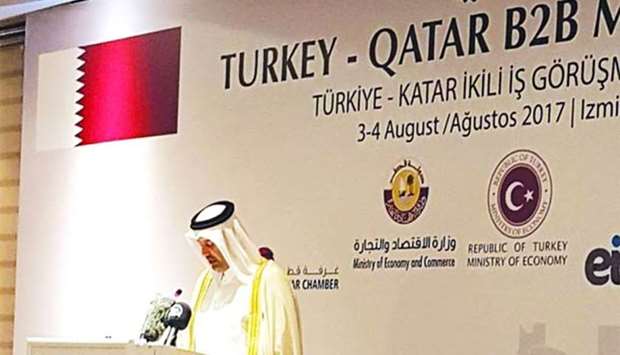*Minister of Economy and Commerce addresses meeting in Turkey
*Country consolidating position on the world economic map
*Country consolidating position on the world economic map
HE the Minister of Economy and Commerce Sheikh Ahmed bin Jassim bin Mohamed al-Thani has stressed that the current crisis represented a new phase in “consolidating Qatar's position on the world economic map and achieving its independence and economic security.”
He was speaking at the opening session of a "B2B meeting" on Thursday in the Turkish city of Izmir. It was jointly organised by Qatar's Ministry of Economy and Commerce and the Turkish Ministry of Economy.
The high-profile meeting was attended by Nihat Zeybekci, Turksih Minister of Economy, besides senior officials and businessmen from both countries.
Sheikh Ahmed said the Qatari economy has proved its “strength and steadfastness” in the face of global economic challenges that have impacted even major economies.
He pointed out that “Qatar, under the directives of its wise leadership, was able to break the siege within hours” through “activation of its strategies and proactive plans” that have been in place for many years and aimed at meeting any local or global crises.
In this context, Sheikh Ahmed highlighted the “combined efforts being exerted” by the country’s public and private sectors through the promotion of local products and opening new channels with Qatar's various trading partners around the world.
“The State of Qatar has succeeded in maintaining the continuous flow of products to the local market and ensured there is no shortage of any consumer goods or other products,” he said.
Qatar’s huge natural resources and their monetisation through gas exports have ensured revenues and played an important role in supporting the country's economy and helped it “withstand the arbitrary measures” taken by the siege countries, which constituted a violation of all international laws, conventions and customs.
He also highlighted “Qatar's keenness to continue business transactions with its major trading partners and the rest of the world,” and stressed that the Qatari economy “would not be affected by the illegal measures” taken by only four countries on the commercial level.
“Qatar has been able to overcome various challenges in terms of exports and the operations at its ports and airport and maintained the development and growth of all economic sectors," the minister said.
"Qatar is one of the largest producers and exporters of natural gas in the world and has the world's largest fleet of LNG carriers."

HE Sheikh Ahmed and Zeybekci lead the Qatari and Turkish bilateral talks on the sidelines of the event.
The minister highlighted the important role Hamad Port played in “bolstering imports and securing alternative commodities” after the arbitrary closure of the country's only land border. He noted that the port represented one of the largest and most strategic port projects in the Middle East region. It has successfully established direct commercial lines with a number of strategic ports around the world.
In respect of Hamad International Airport, the minister said the world-scale facility has contributed to maintaining passenger and cargo traffic at a normal pace to more than 150 destinations around the world.
In this context, the minister said “the successful economic policies adopted by the State of Qatar have contributed to strengthening the national economy, as indicated by the various international economic indicators.”
Sheikh Ahmed noted that Qatar ranks second worldwide in terms of its stable macroeconomic environment, eighth globally on the economic performance index, and 18th on the Global Competitiveness Report 2016. He added that Qatar sovereign fund ranks 14th globally, with assets worth $335bn deployed around the world.
On the contribution of various sectors to the national economy, the minister said the non-oil sector accounted for more than 70% of nominal GDP in 2016. The Qatari economy offers huge investment opportunities not only in the area of food security, but also in sectors related to logistics, sports, tourism and health sectors.
On Qatar’s bilateral relationship with Turkey, the minister said: “The two countries enjoyed fraternal ties and a unique relationship that have grown stronger over the past decades across various fields.”
The minister added that these “relations have reflected positively” on the bilateral trade, which reached QR2bn during the first half of 2017.
He was all praise for the “efforts of the Qatari and Turkish private sectors to break the illegal siege” imposed on Qatar by “providing high-quality alternative consumer goods and products”.
Sheikh Ahmed noted that the Turkish products have proved their value in the Qatari market.
The minister expressed the hope that the meeting at Izmir would contribute to an increase in the volume of bilateral trade, facilitate the flow of Turkish goods and promote successful investment partnerships that will bolster the economy of both the countries and enhance their ability to cope with future challenges.
On the sidelines of the event, Sheikh Ahmed and Zeybekci held bilateral talks during which they discussed a Turkish-Qatari agreement to increase trade and investment flows, facilitate commercial activity and boost bilateral trade.
Sheikh Ahmed explained Qatar’s position at the World Trade Organisation and the state’s recent decision to file a formal complaint with the WTO Dispute Settlement Body against the countries that have imposed the siege on Qatar for violating laws and conventions relating to the trade of goods and services, as well as trade-related aspects of intellectual property.
The Qatari delegation comprised more than 100 businessmen and they have engaged in discussions to promote trade relationship between the two countries, as well as to assess investment opportunities and the establishment of joint ventures in both Qatar and Turkey.
The meetings and bilateral discussions resulted in the signing of a number of agreements and memorandums of understanding between Qatari and Turkish companies in various fields.

